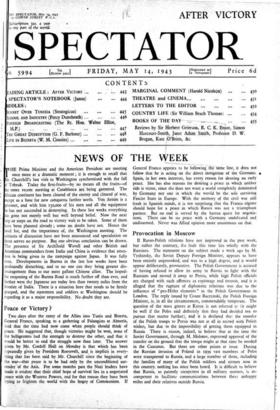Provocation in Moscow
If Russo-Polish relations have not improved in the past week, but rather the contrary, the fault this time lies wholly with the Russians. The statement on the subject made a week ago by M. Vyshinsky, the Soviet Deputy Foreign Minister, appears to have been entirely unprovoked, and was to a high degree, and it would appear deliberately, provocative. The Polish Government is accused of having refused to allow its army in Russia to fight with the Russians and moved it away to Persia, while high Polish officials are charged with such offences as espionage and treason, and it is alleged that the rupture of diplomatic relations was due to the influence of " pro-Hitler elements" in the Polish Government in London. The reply issued by Count Raczynski, the Polish Foreign Minister, is, in all the circumstances, commendably temperate. The question of the mass graves at Katyn is not referred to (it might be well if the Poles said definitely that they had decided not to pursue that matter further), and it is declared tha' the transfer of the Polish troops to Persia was not at all in accord with Polish wishes, but due to the impossibility of getting them equipped in Russia. There is reason, indeed, to believe that at the time the Soviet Government, through M. Molotov, expressed approval of the transfer on the ground that the troops might at that time be needed in the Caucasus. But there are other points at issue. During the Russian invasion of Poland in 1939 vast numbers of Poles were transported to Russia, and a large number of them, including the families of many of the Polish soldiers and airmen now in this country. nothing has since been heard. It is difficult to believe that Russia, so patently competent in all military matters, is in- competent to facilitate communications between these unhappy exiles and their relatives outside Russia.


























